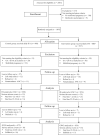Fortified Balanced Energy-Protein Supplementation, Maternal Anemia, and Gestational Weight Gain: A Randomized Controlled Efficacy Trial among Pregnant Women in Rural Burkina Faso
- PMID: 35906874
- PMCID: PMC9535447
- DOI: 10.1093/jn/nxac171
Fortified Balanced Energy-Protein Supplementation, Maternal Anemia, and Gestational Weight Gain: A Randomized Controlled Efficacy Trial among Pregnant Women in Rural Burkina Faso
Abstract
Background: Anemia and suboptimal gestational weight gain (GWG) are associated with adverse maternal and birth outcomes. Limited research indicates that balanced energy-protein (BEP) supplements reduce the incidence of inadequate GWG.
Objectives: We assessed the efficacy of a micronutrient-fortified BEP supplement on the secondary outcomes of anemia, GWG, GWG rate, and GWG in relation to the Institute of Medicine (IOM)'s recommendations, as compared with an iron-folic acid (IFA) tablet.
Methods: We conducted a randomized controlled trial in Burkina Faso, among pregnant women (15-40 y old) enrolled at <21 weeks of gestation. Women received either BEP and IFA (intervention) or IFA (control). Hemoglobin (g/dL) concentrations were measured at baseline and the third antenatal care visit (ANC), whereas maternal weight was measured at baseline and all subsequent ∼7-weekly ANCs. GWG (kg) was calculated as a woman's last weight measurement (at ∼36 weeks of gestation) minus weight at enrollment, whereas GWG rate (kg/wk) was GWG divided by the time between the first and last weight measurements. GWG adequacy (%) was computed as GWG divided by the IOM's recommendation. Binary outcomes included severely inadequate, inadequate, and excessive GWG. Statistical analyses followed the intention-to-treat principle. Linear regression and probability models were fitted for the continuous and binary outcomes, respectively, adjusting for baseline measurements.
Results: Women in the BEP group tended to have higher, but nonsignificantly different, GWG (0.28 kg; 95% CI: -0.05, 0.58 kg; P = 0.099). Furthermore, there were no significant differences in prenatal anemia prevalence, GWG rate, GWG adequacy, or incidence of inadequate or excessive GWG. Findings were robust to model adjustments and complete case and per protocol analyses.
Conclusions: This trial does not provide evidence that fortified BEP supplementation reduces maternal anemia or increases GWG, as compared with IFA. In conjunction with the small, but positive, effects of maternal BEP supplementation on birth outcomes, our findings warrant the investigation of additional biochemical and postnatal outcomes.This trial was registered at clinicaltrials.gov as NCT03533712.
Keywords: Burkina Faso; anemia; balanced energy-protein; gestational weight gain; iron–folic acid; multiple micronutrients; randomized controlled trial.
© The Author(s) 2022. Published by Oxford University Press on behalf of the American Society for Nutrition.
Figures
References
-
- National Academy of Medicine, National Research Council . Weight gain during pregnancy: reexamining the guidelines. Rasmussen KM, Yaktine AL, editors. Vol. 12. Washington (DC): The National Academies Press; 2009. - PubMed
-
- World Health Organization . WHO recommendations on antenatal care for a positive pregnancy experience [Internet]. Geneva, Switzerland: WHO; 2016. Available from: https://www.who.int/publications/i/item/9789241549912 (Accessed 2022 Jan 14). - PubMed


